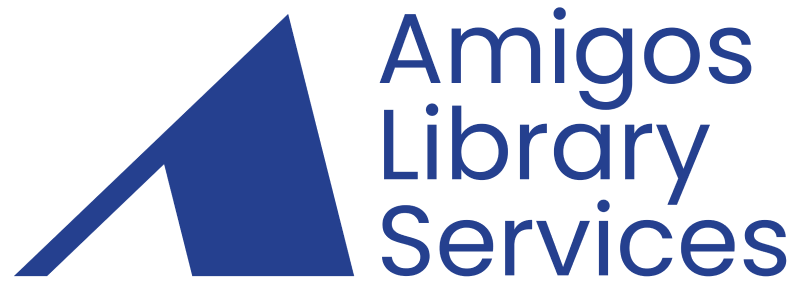
Keynote Speaker: Nick Tanzi - South Huntington Public Library - nicktanzi@gmail.com
Session Time: 10:00 am - 11:00 am CDT
Session Title: Opening Keynote - Uncertain Seas: Navigating Our Libraries Through the Age of AI
Session Description: Artificial intelligence (AI) is an incredibly disruptive technology with the potential to reshape our information landscape.Understandably, AI provokes feelings of fear, anticipation, and bewilderment! How has this technology begun to impact our libraries, and what does the future hold? Take a look at the promise and perils of AI as we chart a course for the future.
Speaker Bio: Nick Tanzi is the Assistant Director of the South Huntington Public Library. He is a nationally recognized library technology consultant and the author of the books Making the Most of Digital Collections Through Training and Outreach (2015) and the coauthor of the Best Technologies for Public Libraries: Policies, Programs, and Services (2020). Nick is a past column editor for Public Library Magazine's "The Wired Library," and his work on the intersection of libraries and technology has been featured in publications including Computers in Libraries, Library Journal, and Marketing Library Services. Tanzi publishes at the-digital-librarian.com.
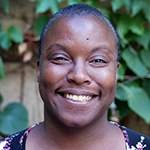
Speaker: Camille Andrews - William & Mary - ceandrews01@wm.edu
Session Time: 11:15 am - 12:00 pm CDT
Session Title: New Realities: Librarian Involvement in Virtual Reality and AI Projects
Session Description: As an instruction librarian in a makerspace and later as science liaison librarian at both large and small universities, the author has participated in various virtual reality and AI projects for education, including doing workshops and class-related instruction on virtual reality and AI, creating 360 video tours, creating an asynchronous virtual reality paper prototyping assignment, and participating in a faculty AR/VR working group and helping create a virtual chemistry lab. There are ways for librarians to be involved in virtual reality and AI for education at all levels, whether their only experience is with Google Cardboard and ChatGPT or they are an expert at creating 360 videos or virtual reality scenes or using machine learning. The library can also be an excellent place to introduce students to virtual reality and AI in a way that reaches across disciplines, invites participation from underrepresented groups, and levels the playing field for all. In this session, participants will learn some basic uses of virtual reality and AI in instruction, identify various ways that librarians can participate in instruction using them, and identify some basic tools and software for using and creating virtual reality and using AI tools in research.
Speaker Bio: Camille Andrews, Instruction and Research Librarian at William & Mary, is liaison to the sciences and African Studies, teaching students not only how to find, manage and evaluate information but also use it to create and communicate through posters, video, 3D modeling and printing, virtual reality and more. She has also been involved in: makerspaces; online learning; assessment for learning outcomes, technologies, services and spaces; information, media and multimodal literacy initiatives; and learning technologies. She is extremely interested in the intersection of library and information science, user experience, instructional design, 21st century literacies and new technologies.
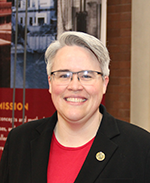
Speaker: Nancy Sims - University of Minnesota Libraries - nasims@umn.edu
Session Time: 11:15 am - 12:00 pm CDT
Session Title: Exploring Copyright and Ethics in the Generative AI World
Session Description: Generative AI (or large content models) are both a hot topic in information literacy, and a very useful lens through which to explore issues in copyright law and the ethics of copying. Permission, fair use, licensing, and book scanning are just a few of the issues involved in how source materials get into content models. On the output side there are issues of copyrightability, originality, authorship, credit, citation, and much more. The training and tuning of content models also present issues around equity, safety, and cross-border worker exploitation. In an interactive session, we’ll review some broadly applicable basics of copyright law, and begin to engage with thorny ethical issues old and new!
Speaker Bio: Nancy Sims is the Director of Copyright & Scholarly Communication at the University of Minnesota Libraries. A librarian and lawyer, Sims helps individuals and groups throughout the University of Minnesota community understand how copyright issues may affect their work. Nancy works within and outside the University of Minnesota to advocate for policies and practices that support sustainable scholarship, democratic information access and wide public cultural participation. Sims earned an MLIS is from Rutgers University and JD from the University of Michigan Law School.
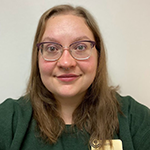
Speaker: Anna Clymer - Northwest Arkansas Community College - aclymer@nwacc.edu
Speaker: Shawna Thorup - Northwest Arkansas Community College - sthorup@nwacc.edu
Session Time: 11:15 am - 12:00 pm CDT
Session Title: Transformative Teaching: Strategies for Integrating AI in Next-Gen Lesson Planning & Information Literacy One-Shots
Session Description: In today's diverse learning environments, one-size-fits-all lesson plans are no longer sufficient. Education is changing, and AI is just one of the many reasons why. In this session, attendees will explore how AI can help brainstorm lesson plans that fit student needs and discuss prompt engineering and tips for using AI to improve and simplify lesson planning for information literacy lessons. By using AI and these new techniques, teachers and librarians can create lessons that connect better with students.
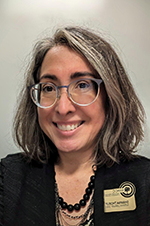 Speaker Bio: Anna Clymer is the eLearning Librarian at NorthWest Arkansas Community College. With a bachelor’s in marketing and an MLIS, she strives to blend traditional librarianship with cutting-edge technology.
Speaker Bio: Anna Clymer is the eLearning Librarian at NorthWest Arkansas Community College. With a bachelor’s in marketing and an MLIS, she strives to blend traditional librarianship with cutting-edge technology.
Speaker Bio: Shawna Thorup is the Head of Reference and Instruction at NorthWest Arkansas Community College, where she has been helping students succeed since 2016. She has an MLS from UCLA and 20+ years of experience in the field of librarianship.
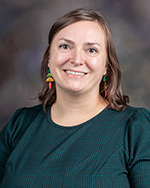
Speaker: Elizabeth Fridrick - University of Houston-Clear Lake - fridrick@uhcl.edu
Session Time: 1:00 pm - 1:45 pm CDT
Session Title: Extend Your Reality - Building Meaningful Collaborative Partnerships with VR Technology
Session Description: VR/AR/XR labs are starting to sprout in libraries and across college campuses quickly. Learn about how one library is responding to this new trend and the steps it is taking to successfully integrate this service into their broader library services.
Speaker Bio: Elizabeth Fridrick earned her Master of Library and Information Science (MLIS) degree from Kent State University and has been working in both public and academic libraries for over 15 years. From her early career as a technology trainer, Elizabeth honed her skills in harnessing the power of technology to empower library patrons. Currently, Elizabeth serves as the Emerging Technologies Librarian at University of Houston- Clear Lake, where she oversees the XR Lab, and teaches information literacy courses.
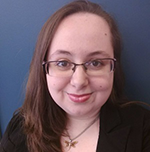
Speaker: Amber Eakin - Strayer University - amber.eakin@strayer.edu
Session Time: 1:00 pm - 1:45 pm CDT
Session Title: The Impact of Language on Generative AI Outputs: Implications for Information Literacy
Session Description: This presentation aims to explore the influence of input language on generative AI outputs and its implications for information literacy. Attendees will investigate how biased versus neutral search language may affect the outcomes generated by AI models. By examining this phenomenon, attendees will gain valuable insights into the effect of using different search language in various information gathering scenarios. The presentation will offer examples to illustrate how biased language may affect information accuracy, credibility, and user perception. Additionally, strategies to enhance information literacy through the use of neutral language will be discussed.
Speaker Bios: Amber Eakin is the Instructional Librarian for Strayer University. She reinvigorated the library's virtual instruction strategy with inspiration from Malcolm's assumptions of andragogy and Grow's Staged Self-Directed Learning. After completing her Master of Science in Library Science in 2011, she earned a Master of Education in Adult Education and Development in 2018. She and her husband live in wild and wonderful West Virginia with their menagerie of pets.
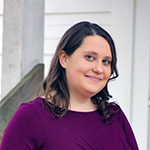
Speaker: Erin Owens - Sam Houston State University - eowens@shsu.edu
Speaker: Evan Fruehauf - University of South Florida-Tampa - efruehauf@usf.edu
Speaker: Kimberly Grotewold - Texas A&M University-San Antonio - kimberly.grotewold@tamusa.edu
Speaker: Rachel Pecotte - Texas A&M University-San Antonio - rachel.pecotte@tamusa.edu
Session Time: 2:00 pm - 3:00 pm CDT
Session Title: The Impact of AI on Academic Libraries: A Panel Presentation
Session Description: The recent emergence of AI tools, such as ChatGPT, is causing a disruption in how libraries provide information to patrons. A panel for academic library experts will share their experiences of how AI is impacting services. The panelists will discuss using AI as a tool for scholarly communication and developing guidance policies and procedures to faculty and students on using generative AI. Attendees will have an opportunity to ask panelists questions at the end of the session.
Speaker Bio: Erin Owens has spent 17+ years in the Newton Gresham Library at Sam Houston State University, supporting information literacy and information access for students, faculty, and staff. In her current role as Scholarly Communications Librarian, she helps researchers from novice to expert with a wide array of topics pertaining to data planning and management; scholarly writing and publishing; impact metrics; and more. As Associate Director of Library Public Services, she also oversees the work of two library units, comprising 8 staff positions and approximately 27 student assistants.
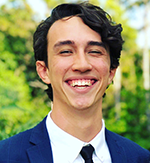 Speaker Bio: Evan Fruehauf is the liaison librarian to the College of Engineering, the Department of Physics, as well as the Department of Mathematics & Statistics. Evan arrived at USF Tampa after several years of working as the Coordinator of Library Operations at USF Sarasota-Manatee, his respective alma mater campus. Following his studies as a Library and Information Science graduate student, Evan has dived headfirst into academic librarianship in hopes of supporting students and faculty. With his experience working on topics related to Generative AI, UX Accessibility in Web Design, and Intellectual Freedom, he hopes to empower the library and its patrons to do even more.
Speaker Bio: Evan Fruehauf is the liaison librarian to the College of Engineering, the Department of Physics, as well as the Department of Mathematics & Statistics. Evan arrived at USF Tampa after several years of working as the Coordinator of Library Operations at USF Sarasota-Manatee, his respective alma mater campus. Following his studies as a Library and Information Science graduate student, Evan has dived headfirst into academic librarianship in hopes of supporting students and faculty. With his experience working on topics related to Generative AI, UX Accessibility in Web Design, and Intellectual Freedom, he hopes to empower the library and its patrons to do even more.
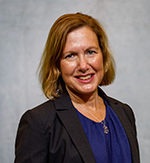 Speaker Bio: Kimberly S. Grotewold has worked in academic libraries since 2008 and has prior experience in K-12 education librarianship and classroom teaching. She has served as the Education Librarian at Texas A&M University-San Antonio since July 2018. Ms. Grotewold is passionate about lifelong learning and teaching. In addition to her Master of Library Science degree, she holds a Master of Science in Higher Education administration and is earning her Ph.D. in Learning Technologies from the University of North Texas. Her current research interests include human-computer interaction, trustworthy applications of AI for teaching and learning, and personalized and adaptive learning in higher education.
Speaker Bio: Kimberly S. Grotewold has worked in academic libraries since 2008 and has prior experience in K-12 education librarianship and classroom teaching. She has served as the Education Librarian at Texas A&M University-San Antonio since July 2018. Ms. Grotewold is passionate about lifelong learning and teaching. In addition to her Master of Library Science degree, she holds a Master of Science in Higher Education administration and is earning her Ph.D. in Learning Technologies from the University of North Texas. Her current research interests include human-computer interaction, trustworthy applications of AI for teaching and learning, and personalized and adaptive learning in higher education.
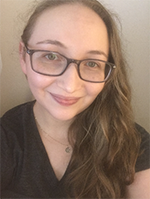 Speaker Bio: Rachel Pecotte graduated from Texas Woman’s University in 2021 with a master’s degree in library science. Today she is the Business Librarian at Texas A&M University-San Antonio where she is liaison to the departments of Finance, Accounting, Management, Marketing, Computing, and Cyber Security. Through student appointments and campus outreach she learned how students interact with and use AI for coursework. This interaction provided valuable insight for building an AI research guide for the library to meet student and basic faculty needs.
Speaker Bio: Rachel Pecotte graduated from Texas Woman’s University in 2021 with a master’s degree in library science. Today she is the Business Librarian at Texas A&M University-San Antonio where she is liaison to the departments of Finance, Accounting, Management, Marketing, Computing, and Cyber Security. Through student appointments and campus outreach she learned how students interact with and use AI for coursework. This interaction provided valuable insight for building an AI research guide for the library to meet student and basic faculty needs.
